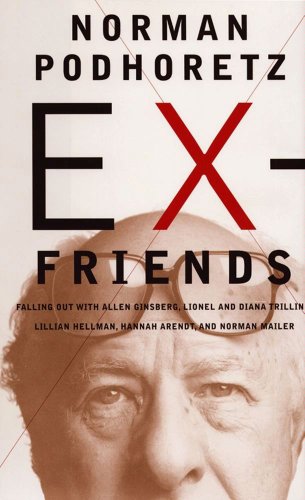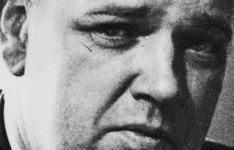Aug 23, 2009
Norman Podhoretz: Ex-Friends
 Ex-Friends:
Ex-Friends:
Falling Out with Allen Ginsberg, Lionel & Diana Trilling, Lillian Hellman, Hannah Arendt, and Norman Mailer
(New York: Free Press, 1999)
It is hard to gauge a book like Ex-Friends by someone like Norman Podhoretz particularly with its claims to the “New York intellectuals.” On the one hand, he knew them and claims to have been a part of them. On the other, he seems to know them little or to do little solid research about them.
Case in point: his ex-friends Lionel Trilling and wife Diana Trilling.
Podhoretz writes of these ex-friends:
I have already said that neither Lionel nor Diana Trilling had ever been a member of the Communist party but that after a brief spell of intense fellow-traveling in the early 1930s they had become very fierce in their anti-Communism. Indeed they (and especially Diana) were at least as fierce as any anti-Communist intellectuals in sight. (p. 106)
This passage rings strangely–because Diana Trilling had said in her own memoirs, published some half decade earlier (and reviewed by Podhoretz’s wife, Midge Decter in Commentary, which Podhoretz edited for more than three decades) quite clearly:
Lionel and I had become Communists through the persuasive reckoning of Sidney Hook at Yaddo but one did not have to be indoctrinated by so gifted a dialectician to turn to Communism as the cure for our failed economy… Under Hook’s guidance, Lionel and I bowed to historical necessity and embraced the new revolutionary faith. (The Beginning of the Journey, p. 194-195, 183)
It is disturbing to see Podhoretz continue the same myth about “card-carrying Communists” propagated by Senator Joe McCarthy. Diana herself explains:
To this day we still speak blithely of “card-carrying Communists,” as if in the eaerlier years of this centry to have been a dedicated Communist mean that one had to be a member of the Communist Party. Actually, only a small minority, a handful of Communist sympathizers, were Party members. The great majority were fellow travlers, people who in one or another degree were committed to the Communist cause and who, whether they were wholly conscious of it or not, took their direction from the Party but did not submit to its discipline. This was how the Soviet Union wanted it. (Trilling, pp. 179-180)
According to Diana, she and Lionel were Communists. In fact, “Lionel’s and my intimacy with the radical movement of the early thirties… made anti-Communists of us” (p. 181) — a history which Podhoretz does not present as clearly or accurately.
There are several mentions of Whittaker Chambers. In one instance, Podhoretz argues against “the political corollary of the antisecularist position (held most prominently by Whittaker Chambers and William F. Buckley, Jr.)” (p. 70) — a rare example of Chambers’ name preceding Buckley’s (and perhaps an effort by Podhoretz to earn yet a new “ex-friend” — if Buckley ever was a friend, or if he was not an ex-friend already by 1999).
Perhaps of greatest interest when mentioning Chambers is Podhoretz’s reminder of the use of “Kronstadt” by Louis Fischer in The God That Failed (1949) — the moment in which “belief in the Soviet Union as a utopia-in-the-making had been shattered” (p. 105). Sadly, Podhoretz does not quote what became for many disillusioned Communists (including Whittaker Chambers) the defining moment of their lives:
What counts decisivelly is the “Kronstadt.” Until its advent, one may waver emotionally or doubt intellectually or even reject the cause altogether in one’s mind and yet refuse to attack it. (The God That Failed, p. 204)
Instead, he demeans Fischer’s by offering up his own, derivative interpretation, saying “The summary I provide of these ‘Kronstadts’ in my own book The Bloody Crossroads< and which I am more or less producing here, was my own.” (p. 105, footnote)
As a final note, Ex-Friends is heavily a reworking of previous material:
A briefer and somewhat different version of Chapter One originally appeared in Commentary under the title “My War with Allen Ginsberg.” All the rest is new, though a few bits and pieces were adapted from some of my previously published writings. (p. 235)
To write the book, Podhoretz received grant monies from the Lynde and Harry Bradley Foundation, the Carthage Foundation, the John M. Olin Foundation, not to mention the Hudson Institute and Commentary (for reprint permission).
(Mentions on pages 70, 77, 105, 109, 173-174)
Reviews:
National Review
New York Review of Books
New York Observer
Weekly Standard
New York Daily News
H-Net
Washington Monthly

[…] the full article here Possibly related posts: (automatically generated)Norman Podhoretz: Origins Of […]